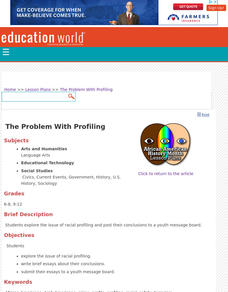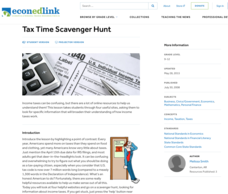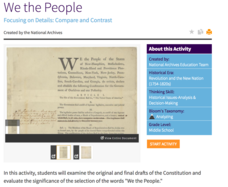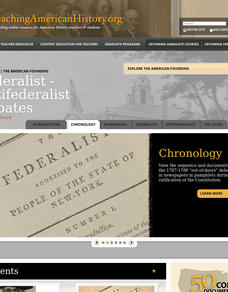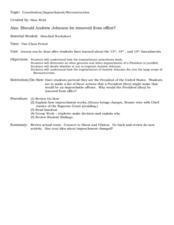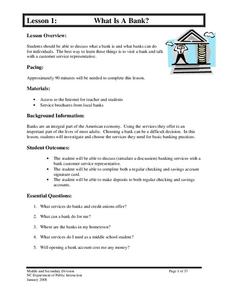C-SPAN
What Are Ways for Youth to Engage in Politics?
Help young people become excited to participate in politics. High school historians participate in an engaging lesson focused on ways for youth to become involved in government. Scholars review articles, videos, and essential vocabulary...
Constitutional Rights Foundation
Winner-Take-All: The Two-Party System
Two's company, three's a crowd. High school historians learn about the Electoral College, a two-party, winner-take-all voting system in the United States. The lesson plan explains the pros and cons of the two-party system, roadblocks for...
Curated OER
The Problem with Profiling
Students explore the issue of racial profiling and post their conclusions to a youth message board. They research the issue of racial profiling and post their thoughts to a message board.
Scholastic
What Makes a Leader?
After creating a list of great American leaders from the last century and researching their lives, pupils will brainstorm aspects of leadership and discuss what traits may be shared by all leaders.
Curated OER
Globalization and Consumerism
Is the expansion of American corporations abroad a good or bad thing? After examining the global operations of Ford Motor Company, McDonald's, and Walmart, class members are asked to evaluate the impact of globalization and...
Constitutional Rights Foundation
History of Immigration From the 1850s to the Present
The Statue of Liberty may embrace the huddled masses of the world, but has American society always joined in? After young historians read a passage about the history of American immigration in the 19th and 20th centuries, focusing on...
Roy Rosenzweig Center for History and New Media
Founding Documents
Teach the class about the predecessor to Declaration of Independence—the Virginia Declaration of Rights. Using the foundational documents, scholars examine the two writings to consider how they are similar and how they are different. A...
Center for Civic Education
Citizenship Schools and Civic Education During the Civil Rights Movement and in the Present
Your young historians will discover the importance that citizenship education has played in the social progress of the United States as they learn about early efforts to discourage African Americans from voting in the 1960s.
Annenberg Foundation
Global America
It's not really a small world after all! The 21st lesson of a 22-part series on American history researches the impact of globalization on the United States. Using photographic and written references materials, as well as video sources,...
Council for Economic Education
Tax Time Scavenger Hunt
Is a 1040EZ tax form really easy? Scholars investigate the complexities of the United States taxation system with an economics lesson. Using a wide variety of web sources, they interpret IRS taxation rules and regulations to better...
US National Archives
We the People Focusing on Details: Compare and Contrast
Even the most inspiring documents in American history had to go through a few drafts before they were ready for publication. Reinforce the importance of the writing process, as well as the collaborative nature of democracy, with an...
Ashbrook Center at Ashland University
Federalist - Antifederalist Debates
Who should have the power—individual states or the federal government? Scholars research the arguments of the Federalists and Anti-Federalists during the formation of the United States Constitution. Online resources, including a vast...
Curated OER
Constitution/Impeachment/Reconstruction
Eleventh graders analyze a chart comparing U.S. census data from 1850, 1880, 1900, and 1920. They read a handout summarizing immigration legislation from 1882-1996 and create a graph charting how open / closed U.S. immigration is over time.
North Carolina Department of Public Instruction
What Is A Bank?
You're never too young to learn about banking and personal finance. Use a set of seven banking lessons to teach middle schoolers about checking and savings accounts, interest rates, loans and credit cards, and safety deposit boxes.
C-SPAN
Should States Shift to Mail-In Voting during the Coronavirus Pandemic?
With the coronavirus pausing many norms in American society, officials are trying to decide how to safely hold voting in the 2020 presidential election. Using curated video clips, including speeches from Congress, journalists, and...
Federal Reserve Bank
History of Money and Banking in the U.S.
Why was there a lack of confidence in the money and banking system of the early United States government? What historical events led to the establishment of the Federal Reserve System? Here you'll find reading materials and worksheets to...
Judicial Learning Center
Law and the Rule of Law
We hear a lot about the importance of the rule of law, but most people do not really know what those words mean. The lesson is a webpage that defines the rule of law, explains why it is important in a democratic society and provides...
Curated OER
Technology and the Media
Students are introduced to the roles and influence of technology and the media on American representative democracy. They examine the effects of the Internet on citizens' role in government and the role and effects of media on the...
Curated OER
Race and Voting in the Segregated South
Learners examine the history of African American voting rights. In this voting rights instructional activity, students listen to a lecture on African American voting rights between the years 1890 and 1965. Learners respond to...
Curated OER
The Homefront: America and WWII
Students are introduced to the experiences of various groups of Americans at home during WWII, highlighting race, gender, and ethnicity. They improve their ability to analyze and interpret historical documents and images.
Curated OER
Representation: Majority Rule
Students explore government. In this decision making lesson, students discover the importance of majority rule in the passing of bills. They all participate in a class debate and practice the different forms of decision making. This...
Stanford University
King Philip's War
King Philip's War was the crescendo of a violent period between the Pequot and English colonists. Using documents from English settlers, including a contemporary report on the conflict, learners explore the little-known period. They then...
National Endowment for the Humanities
The President Under the Articles of Confederation
The Articles of Confederation sounds like one big, fancy title to middle schoolers. Here, scaffolded steps help to ease novices into understanding this all-important American document. Discussion questions, lesson activities, and ideas...
Curated OER
Protecting Your Identity--and Helping Other Protect Theirs
Students create a presentation explaining how they can guard against identity theft. Prior to creating the presentation, students research identity theft: how it occurs, how to avoid it, what to do when someone thinks it has happened to...




